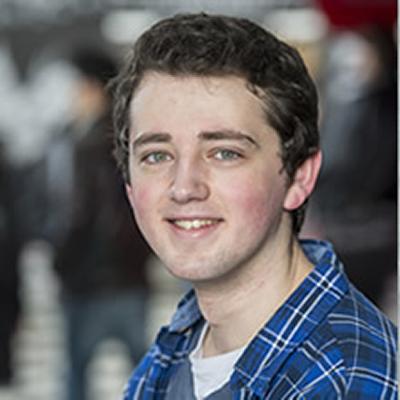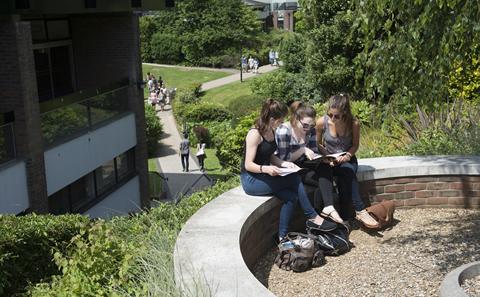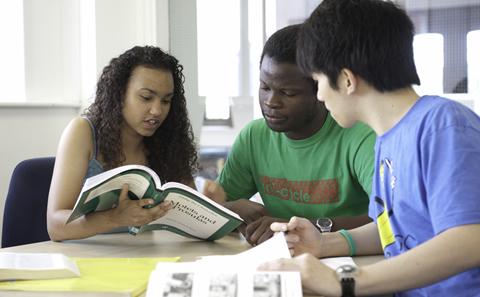Robin Johnson MEng Software Engineering 2015

The great thing about Southampton is that there are so many academic and non-academic opportunities.
What made you choose Southampton?
The people. I came to an Open Day and found everyone – staff and students – really friendly and engaging. It seemed very vibrant with lots of things happening and many opportunities. Student blogs were helpful too in making it real – they were open about the work being challenging but that they got through it.
What were your Southampton ‘highlights’ whilst you were studying here?
The great thing about Southampton is that there are so many academic and non-academic opportunities.
The third year project was a particular academic highlight – using computer-based video analysis techniques with footage of theatrical performances, I created a system that could suggest and make edits to a live show. At the time I had a great sense of completion and I can look back on it now as something I created that worked.
Through the Students’ Union I’ve also had amazing opportunities and experiences to perform in, produce and direct numerous theatre productions – some of which we took to the Edinburgh Festival.
What did you enjoy most about your course?
I enjoyed the creativity. People may not associate computer sciences with creativity but it really can be. Within the group projects, we work in teams to innovate and there are lots of design ideas that could easily convert to commercial products.
The group projects may seem daunting but you are eased into it and supported through the process. You mainly work on an individual basis in the first two years and then the balance shifts in the third and fourth years. You work in different groups on different projects so you get to learn about group ethos and dynamics.
What are the strengths of your course and of your department?
The variation. It never feels like you are just programming or just learning theory. From the first year, there are opportunities for so many different starting points such as artificial intelligence or human-computer interaction. Whatever your interests you can quickly move from a broad overview to specialise in something niche.
The variation in modules can help you get a sense of the direction you are headed in. You can find out what you like and enjoy. The Careers Hub job listings also help with that as they span industries and are not restrictive.
How would you describe your learning environment (facilities, labs, equipment etc)?
Fantastic. From the first visit you're completely blown away by the huge array of crazy equipment.
What networking, employment and work experience opportunities did you undertake and did they enhance your Southampton experience?
Extra-curricular work placements are frequently promoted through the ECS Careers Hub and they also organise careers fairs where you can get to talk directly to high profile employers.
I had the opportunity to organise a conference on the theme of multimedia for an audience of internal students and external multimedia trade. My experience included chairing the conference and also organising speakers and sponsors.
What opportunities did you take up (within your degree programme and extra-curricular)? In what ways did they help your personal development?
I was a regular blogger at http://www.lifeatsouthampton.com.
Through my work with theatre productions I have developed skills in acting, producing, directing, project management, resource management and time management.
I have also had the opportunity to work as a presenter on the Students’ Union TV and radio stations.
Did you have the opportunity to study modules outside of your core subject area, and how have they added to your success after leaving the University?
Languages.
Did any exposure to employer involvement or research led learning during your course help you achieve your ambition? If so, how?
The Group Design Projects revolve around developing a product for a client – from pitch to design and prototyping. The project I worked on had the Institute of Sound and Vibration Research as a client. We built a prototype for a remote hearing test. This would allow people with potential hearing difficulties to test their hearing – perhaps at home – without the need to travel to a test centre. It simulates a real-world environment where you are designing products to fulfil a real need and meet the requirements of a business client.
What problems/issues does your study deal with and what difference could this have in the world?
Understanding the world as it is developing e.g. the web science modules where the theories – such as models of human behaviour – are changing in real-time. As you look at how people behave, you can start to predict how technologies and social media will change and how you can contribute to that change.
Would you recommend Southampton to new students – and why?
It’s a fantastic place and it’s what you make of it. You’re given the foundation to push yourself to the next level whether that’s Students’ Union events, volunteering, academic work, incredible research around you, seeing other peoples’ coursework and projects – it’s ridiculously inspiring.
I would advise people thinking about coming here not to be nervous – get stuck in and make the most of your time. There is so much support and, although you may not realise it, everyone has the same challenges to face. That’s what pushes you together.


